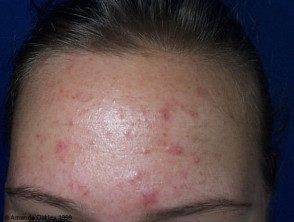During pregnancy, the severity of acne can improve or worsen. It is common for acne to get a little worse in early pregnancy and to get better as pregnancy progresses. This may be related to increased levels of estrogen present in pregnancy.
Some women have severe acne breakouts during pregnancy.
Acne in pregnancy

Acne in pregnancy
Acne treatment in pregnancy.
In general, it is preferable to avoid drugs in pregnancy if they have an effect on the fetus.
What treatments are safe during pregnancy?
The absence of safety data can make it difficult to advise on the treatment of acne in pregnancy. Most experts agree that current Treatments that can be used safely in pregnancy include:
- Benzoyl peroxide
- Azelaic acid
-
Fruit acids such as glycolic acid.
- Low concentration salicylic acid preparations.
Topical antibiotics and oral erythromycin may be prescribed if the acne is severe. Other antibiotics that can be prescribed are penicillins and cephalosporins.
Light and To be Acne therapies are also safe.
What treatments are not safe during pregnancy?
The following drugs should be avoided in pregnancy or if you are contemplating pregnancy.
Do not use topical preparations containing:
-
Current retinoids (tretinoin, isotretinoin, and adapalene)
- High concentration salicylic acid.
Do not take the following oral medications:
-
Tetracyclines in later pregnancy, e.g. Eg Doxycycline, Minocycline, Limecycline, these can discolor the baby's teeth.
- Other oral antibiotics like trimethoprim + sulfamethoxazole or fluoroquinolones
-
Isotretinoin - a teratogen if taken during early or mid-pregnancy, causing fetal loss (miscarriage) or severe birth deformities

